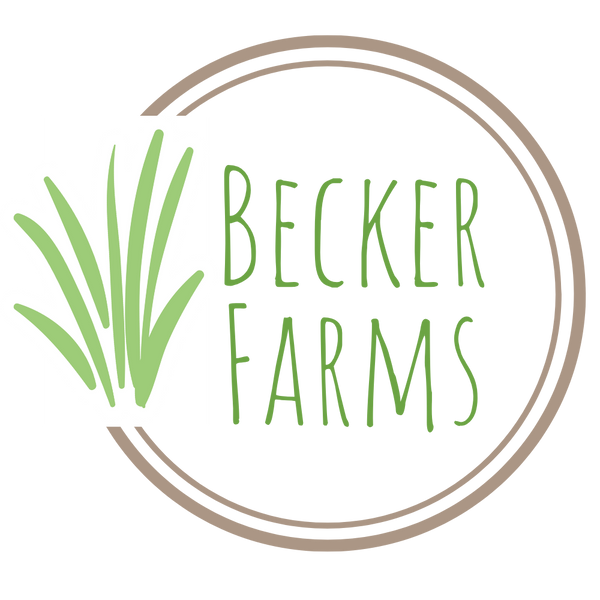FAQs About Becker Farms
FAQs
Welcome to our FAQs — we know how important it is to understand where your food comes from, and we’re here to help. Have a question that’s not answered below? Just email, call, or catch us at the Carmel or Fishers Farmers Markets.
01. Are your meats organic?
We are not certified organic, but many of our practices meet or exceed organic standards—from pasture-raising, non-GMO grains, to natural feed supplements. We aim to offer pasture-raised meat with integrity, without the premium price tag.
02. What do your animals eat?
Cattle graze on diverse pastures—grasses, herbs, legumes, and forbs—with a small amount of non-GMO grain during winter.
Pigs, chickens, and turkeys get fresh pasture plus our custom, GMO-free feed mix—sea kelp, sea salt, corn, soy (temporarily reintroduced due to sourcing), sunflower, cold-pressed canola, black beans, and field peas for nutritional balance and health.
All feed is ground and mixed on-site. Sea kelp delivers over 90 bioactive vitamins/minerals; Redman’s sea salt offers biologically-available iron—both critical for nutrient-dense, pasture-raised meat.
03. Is your feed GMO-free?
Yes—absolutely GMO-free.
04. What is your approach to antibiotics and hormones?
We prioritize animal health through strong pasture and care practices—so treatments are rarely needed. We never use antibiotics, hormones, or vitamin injections for growth. We do vaccinate cattle and follow a six-month window before slaughter to ensure safety. Kyle, our DVM, monitors livestock health diligently.
05. Do you raise all of the animals you sell?
Yes! We raise cattle, pigs, chickens, turkeys, and laying hens right here on our Indiana pastures. To mitigate risk, some animals are raised on additional farms—especially after a flood taught us to diversify our operations.
06. Where are your products processed?
We do not process on-farm. All livestock are processed at USDA- or state-inspected facilities, ensuring compliance with regulations and supporting regional processors.
07. Can I buy fresh, unfrozen meats?
No—we sell frozen products only, per health regulations, to ensure quality and safety.
08. What are the safest methods to thaw frozen meat?
Thaw in the refrigerator—overnight for small cuts, several days for large roasts.
Use cold running water, the microwave (cook immediately after), or cook from frozen (e.g., browned ground beef, or a crockpot chicken).
Never thaw at room temperature—that creates a “danger zone” ideal for bacteria growth.
Use cold running water, the microwave (cook immediately after), or cook from frozen (e.g., browned ground beef, or a crockpot chicken).
Never thaw at room temperature—that creates a “danger zone” ideal for bacteria growth.
09. Do you offer nitrate-free or natural-cure meats?
Yes! We provide both traditional (sodium nitrate) and natural-cure options. Natural cures use celery root, cherry, or beet powder. We also have uncured pork belly (“fresh side”) that you can brine or season yourself.
10. Do you carry bones for stock / bone broth?
Absolutely! Options include beef soup bones, beef stock bones, chicken frames, turkey wings, and necks. If you need more than what’s available at the market, just let us know—we’re happy to bring extras.
11. Can I find all of your products at farmer's markets?
We strive to stock a wide selection year-round. However, for best availability, we recommend pre-ordering—especially for specific cuts like filet mignon. Pre-orders are due by 8 AM on Mondays and Wednesdays (depending on pickup day).
12. Can I buy in bulk?
Yes! We offer:
Beef & Pork: quarter, half, and whole animal options.
Chicken: full-case orders come with a 10% discount.
13. What is CSA?
A Community Supported Agriculture (CSA) share connects you to local, seasonal food. You choose from bundles or customize your own. CSA runs two six-month seasons (Nov–Apr and May–Oct), and signing up ensures fresh, farm-picked meats with convenience and savings. Deadlines: October 15 (winter) and April 15 (summer).
14. Can I visit the farm?
Yes—we love showing guests where your food comes from. Schedule your visit ahead of time via phone or email so someone is here to greet you.
15. Do you have an onsite farm store?
Not yet—but we’re working on it! Stay tuned.
16. What kind of laying hens do you have?
We care for approximately 1,500 Amberlink hens, each laying about six eggs per week. We process, label, and pack eggs as quickly as possible to ensure freshness.
17. Why are your eggs labeled “Grade B” and medium-sized?
Indiana labeling standards are specific: eggs must be weighed individually and candled to label them “Grade A” or “Large.” We package by the dozen without those labor-intensive steps, so we label them “medium (or larger)” and “Grade B”—all part of our commitment to efficiency and regulatory compliance.
18. What about egg expiration?
Indiana regulations require an expiration date—ours is 45 days from the date of collection, which ensures you’re using fresh eggs.
19. Do you refrigerate eggs?
Yes—immediately after collection. Keeping eggs at or below 45°F aligns with state and local food safety requirements.
20. What is pet food supplement?
We offer a pet food supplement made from ground poultry organs and bones. Sold frozen in 1-lb packages. Introduce gradually into your pet’s diet for best results.
21. Do you offer cooking tips?
Yes! We share recipes and cooking advice—particularly helpful with pasture-raised, grass-fed meats or whole-chicken cooking. Visit our blog for fresh inspiration.
22. Do you sell Thanksgiving turkeys?
Yes! Each year we offer pasture-raised turkeys of various sizes (under 12 lbs, 12–16 lbs, 16–19 lbs, and 19+ lbs), plus breasts, drumsticks, wings, and more—perfect for your holiday feasts.
23. Why do you farm this way?
We prioritize responsible, regenerative practices, even when they’re more labor-intensive. It's about feeding families—not trends—with food that’s healthy, local, and transparent. Our goal is to always feed your family well!
24. How do you manage all of this?
We don’t do it alone. Balanced planning, thoughtful prioritization, and a dedicated team help ensure everything gets done—one meaningful meal at a time.



